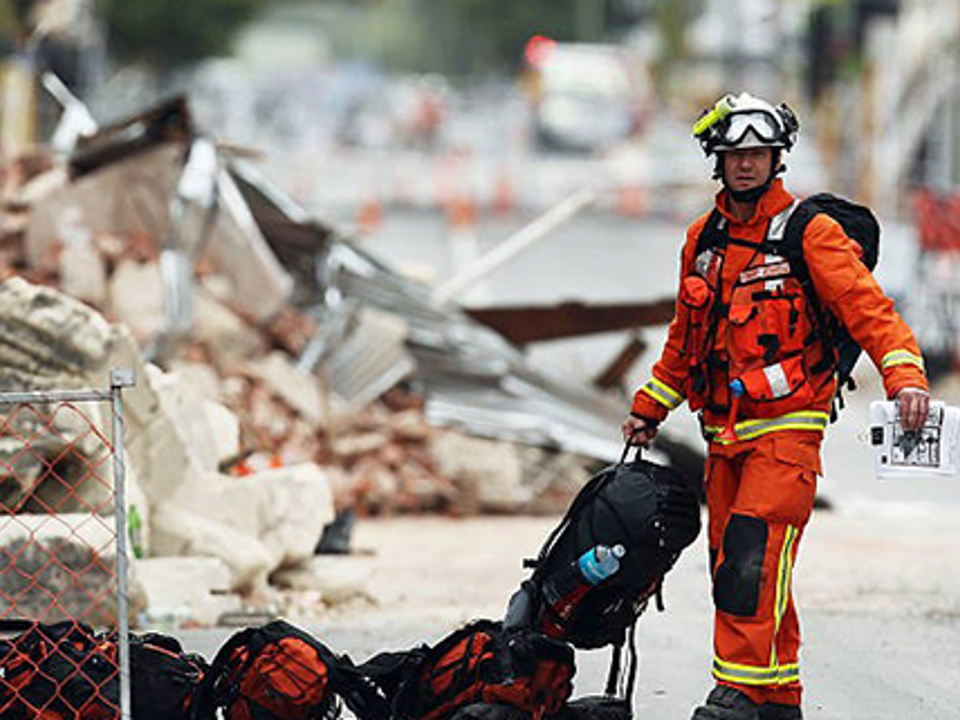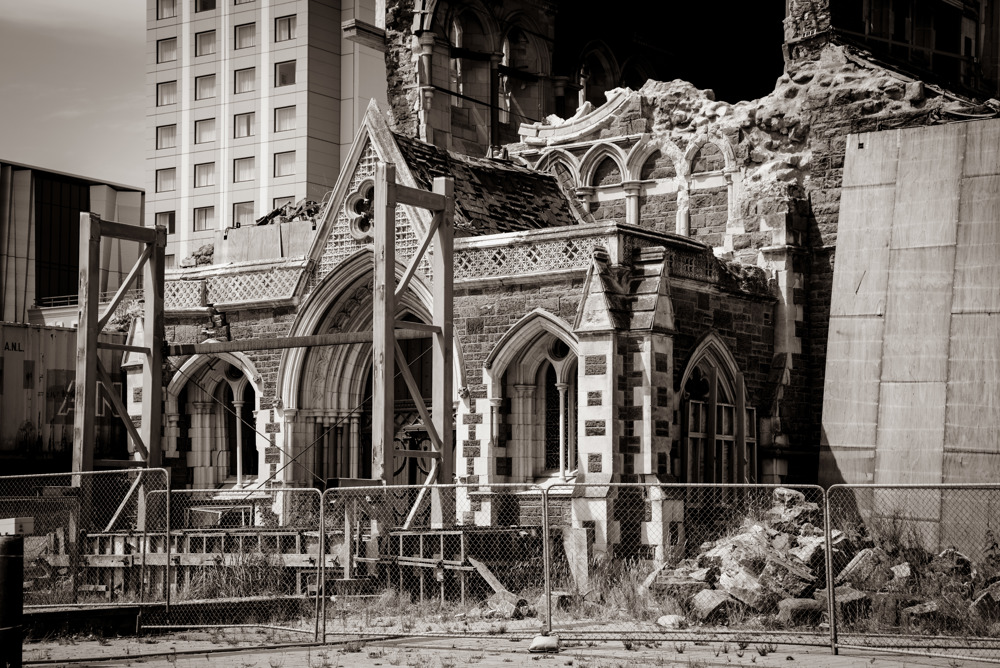Terry Jewell
The stories behind a 30-year career in civilian international search and rescue
In Terry Jewell’s work, uncertainty and addressing new challenges is par for the course. As the longest-serving member of the United Kingdom International Search and Rescue (UKISAR) team, he has been deployed to crisis zones all over the world. Here, we celebrate an incredible career and dedication to excellence in health and safety that has helped to save lives.

Six hours’ notice to move
On the surface, it sounds pretty straightforward. Six-hours’ notice to move literally means that to Terry and the UKISAR team. Consisting of approximately 72 people, they’re selected from across 14 fire and rescue services in England, Wales and Scotland, as well as personnel made up of doctors, paramedics, nurses, vets and structural engineers. They have to be at the departure airport ready to deploy to the country or disaster zone in question within six hours from the moment the call comes in.
The average Joe or Jane might find that pretty daunting, but not Terry or the team. He says this is something he grew totally used to – it’s the easy bit with all kit and equipment held in one location, ready for transport to the deployment airport and the full team trained and clear on their roles. The tough bit is everything that goes on up the chain behind the scenes before the call even comes in.
In order for the team to receive the call that kicks in six-hours’ notice to move, the Foreign Commonwealth and Development Office (FCDO), within whose remit the UKISAR team belongs, has to get the details and all clear from the UK Government. And that’s where the first step is taken to ensure that safety and health is a priority in all decisions made.
So, once the country affected has asked for international aid and it’s been deemed appropriate for the UK to answer the call, a safety and health assessment is carried out to determine whether the UKISAR can deploy. That’s to ensure any politically sensitive or dangerous scenarios are taken into account and don’t pose a significant threat to the UKISAR team, which is a civilian unit.
Terry recounts how this was likely to be a big consideration in the unit’s last deployment, which provided search and rescue and humanitarian aid in the aftermath of the Turkey-Syria earthquake, due to the proximity to the Syrian border and instability in the region.
Terry Jewell, a stalwart of the UK’s International Search and Rescue team
- Has worked in crisis zones affected by natural disaster and accidents, from New Zealand to Nepal.
- Most recent deployment was to provide search and rescue and humanitarian aid in the aftermath of the Turkey-Syria earthquake.
- Continues his exceptional work with the Fire and Rescue Service as a Special Operations Support Officer.
Safety and health has no borders
Every UKISAR deployment has at least one appointed health, safety and security officer who is responsible for the welfare of the whole team. Terry has played this role in multiple missions, including his deployment to New Zealand in response to the major earthquake that struck Christchurch in 2011.
And it’s no small task. In order to qualify to take this role on missions, you must first attain a certain managerial rank in your local fire and rescue service, taking you up to and beyond safety and security manager, as well as holding the right qualifications that validate your understanding of crucial health and safety principles in multiple working environments.
In Terry’s case, he also worked in a health and safety-specific department in the fire service for a portion of his career, gaining IOSH Technical status followed by a period as the deputy head of the emergency planning department. Additional specialist safety and health qualifications are then also required, such as hostile environment training and security risk management.

Protecting the UKISAR team at home and away
It’s this commitment to health and safety standards that helps to protect the UKISAR team at home and on deployment, as well as protecting those in the local region where the disaster has struck. The UKISAR team is not just the only internationally deployable heavy search and rescue team in the UK, it’s also one of just two United Nations (UN) International Search and Rescue Advisory Group (INSARAG) certified teams in the UK, a classification required to qualify for international search and rescue missions of the type the team carries out.
That’s no easy status to achieve as, in order to classify, you must be able to do some specific things. In their simplest terms that’s being able to:
- split your team into two separate teams on the ground if the situation requires it
- work on rotating shifts round the clock to provide 24/7 search and rescue assistance
- be completely self-sufficient, not requiring anything from the host nation.
So when asked about how it’s possible to prioritise areas of safety and health in crisis zones with so much to take into account, when the stakes are so high, the days so long and with people’s lives on the line, Terry was audibly surprised.
He said: “When deploying to crisis zones, time is precious and every single person on the team knows their role. If I’m the team leader or the deployed health, safety and security officer, I’ve got a responsibility to the team, so it shouldn’t be a surprise that that’s my top priority.
We’re heavily drilled and trained on the UK fire service incident command system (co-ordination structure) as well as UK health and safety legislation, as both form the basis of ‘business as usual’ in our day jobs. And just because we’re not in the UK for these missions does not mean we cut corners.”
More people require humanitarian assistance every year, with an estimated 306 million people assessed to be in need in 2021 – that is 90 million more than in 2019 before the Covid-19 pandemic.
Terry’s commitment to safety and health and always ensuring the highest standards of welfare for his team are completely non-negotiable. They’re always prepared for the unexpected. Whether it’s deploying with kit for all eventualities – even including tools you might not expect like a chainsaw – to ensuring all appropriate PPE is brought and worn for that specific kit, Terry’s passionate in showcasing that just because they’re on foreign soil doesn’t mean they no longer abide by UK health and safety law.
The ongoing commitment from the full UKISAR team to the fundamental principles of health and safety has resulted in numerous missions that Terry refers to as ‘textbook missions’ from a health and safety standpoint. In his deployments to Indonesia, Christchurch in New Zealand, the Gorkha earthquake that struck Nepal in 2015, and most recently the role he played in the Turkey-Syria earthquake deployment, Terry’s team treats every situation the same.
“When we land, we start by just doing our jobs,” said Terry. “It’s just like a fire incident in the UK and you follow the exact same rules. Whether it’s decontamination regulations, welfare rules, PPE requirements or anything in between, it’s no different. And that’s the secret to ensuring we make the right kind of impact in these situations.”
Terry Jewell
Looking back at an inspirational career
Terry was rightfully recognised for his standout career earlier in January when he was awarded an MBE in the King’s New Year Honours list.
Terry talks about this recognition being totally surreal and although he’s incredibly honoured and proud to receive the award, Terry’s humble nature also makes him feel slightly awkward and inspires a bit of guilt. Why? Because the nature of the UKISAR isn’t about the individual, it’s about the team.
“Of course it makes me feel a bit weird,” Terry says. “The work we do is a huge team effort and the UKISAR is a big machine with an equally big team behind it. So while I’m proud to have received an MBE, part of me also always remembers that it’s not just recognition for me, it’s that of everyone I’ve ever worked and deployed with.”
He also laughs about the tongue in cheek banter from the rest of the team, who’ve made the most of some good-natured teasing since Terry’s award came through.
Terry’s story is one that inspires for so many reasons. He and his team work in some of the most difficult conditions imaginable, pulled away from family and friends at incredibly short notice, yet his commitment to the work carried out by the UKISAR team and looking after the welfare of his team and people on the ground is unwavering.
Being able to save lives and run missions of this type, even in extreme conditions, just demonstrates the power of what human endeavour can achieve in a secure environment where the fundamental principles of safety and health are always protected and enacted.
 IOSH
IOSH